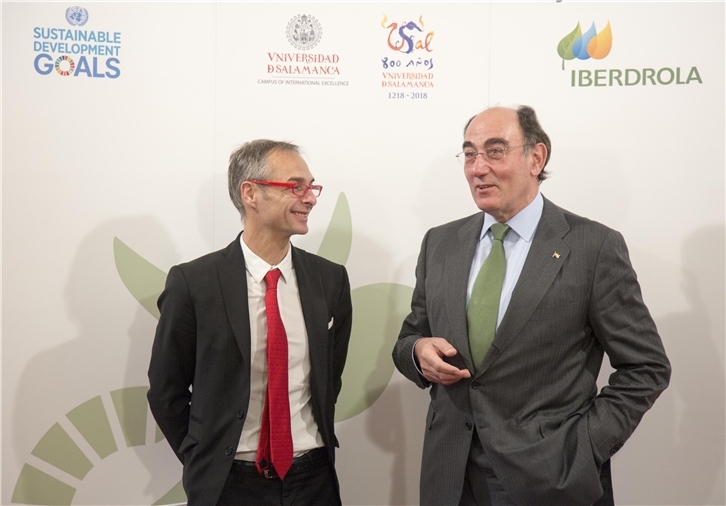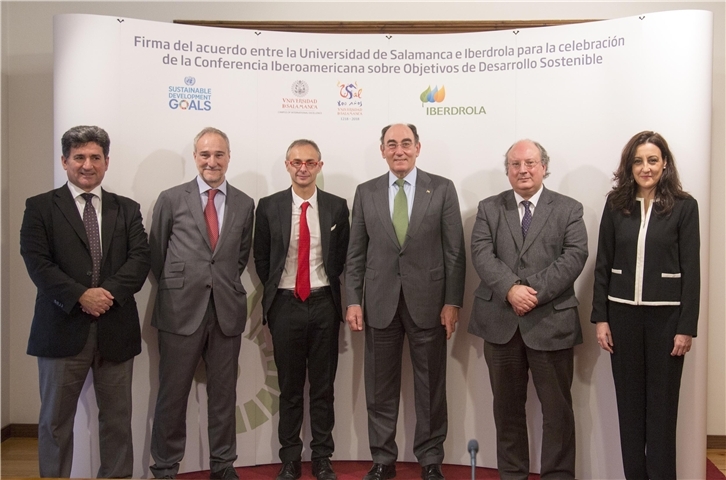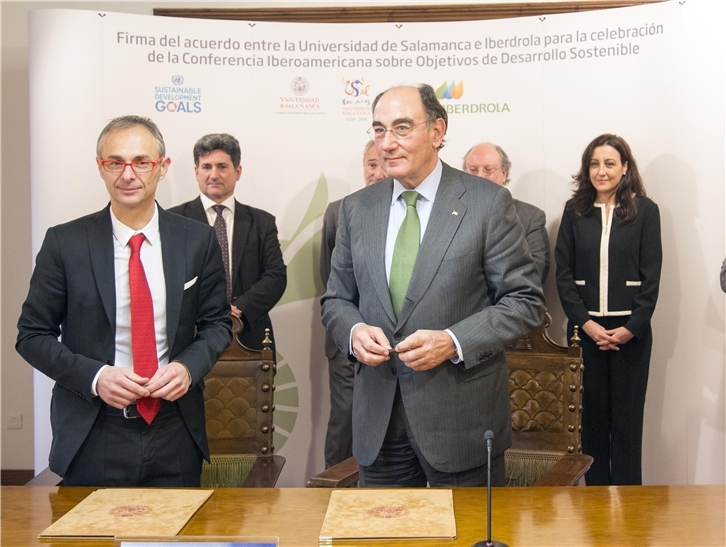News
Both institutions strengthen their collaboration in the field of sustainability, training and research
The University of Salamanca and Iberdrola sign an agreement for the celebration of the Iberoamerican Conference on Sustainable Development Goals
- Involved with the fulfilment of the UN SDGs, they are organising this conference that will take place on June 28 and 29 in the city of Salamanca and that aims to become a meeting of international reference in the study and dissemination of these objectives.
- Within the framework of the celebration of the Eighth Centenary of this academic institution, Iberdrola will allocate up to €1.5 million to promote university-business collaboration and the transfer of knowledge between the academic and business world
The University of Salamanca (USAL) and Iberdrola today signed an agreement to hold the Ibero-American Conference on Sustainable Development Goals (SDGs), thus strengthening their collaboration in the field of sustainability, training and research.
Both institutions, involved in the fulfilment of the UN SDGs, are organising this conference that will take place on June 28 and 29 in the city of Salamanca and which aims to become a meeting of international reference in the study and dissemination of these objectives.
The agreement was signed this morning in the Portrait Hall of the Rectorate by the Rector of the University of Salamanca, Ricardo Rivero, and Iberdrola's Chairman, Ignacio Galán, in the presence of the Special Ambassador for the 2030 Agenda on Sustainable Development, Juan Francisco Montalbán; the vice chancellor for Academic Policy and Social Participation, Enrique Cabero, and the deputy director of the Department of Applied Economics, Victoria Muriel, among other academic authorities.
This conference, which also has the collaboration of the Polytechnic University of Madrid (UPM), will have a wide institutional presence and will be a meeting point for prestigious national and international representatives of all the sectors involved. It will be structured in four work areas: education, innovation, environment and public-private partnerships, on which it is expected that round tables will be organised prior to the central days of next June.
Sustainable Development Goals are a unique opportunity, both to better respond to the changing expectations and aspirations of the society in which we live and to develop strategies and innovative business models adapted to a world undergoing profound changes.
It is everyone’s responsibility to provide the momentum for a profound social transformation, from citizens to public administrations, via companies, universities and third sector entities, so that we can face challenges such as fighting against poverty and inequality, mitigating and adapting to climate change, conserving biodiversity, as well as the energy transition, improving governance and achieving universal access to health, education and energy which, to a large extent are brought together by the UN’s SDGs.
Iberdrola supports USAL’s eighth centenary
The organisation of the Ibero-American Conference on Sustainable Development Goals is part of the commemorative events of USAL's Eighth Centenary, for which Iberdrola will allocate up to €1.5 million in order to promote university-business collaboration and the transfer of knowledge between the academic and business world.
Within the actions that Iberdrola is promoting in support of the celebration of this event, there is also the VIII Centennial Iberdrola Chair, whose main objective is to promote research in the energy and sustainability area through a system of public-private collaboration, creating research, teaching and, where appropriate, transference units, destined to bring prestigious researchers into the academic institution.
In this way, Iberdrola has wanted to be a pioneer in fostering collaboration with USAL in order to promote excellence in research and the internationalisation of the university, as well as serving as a model, which encourages other companies to promote similar collaboration schemes.
On the other hand, it has supported the Startup Olé event, oriented and designed to boost talent, create jobs and promote the culture of entrepreneurship among students and entrepreneurs. Likewise, the company promotes the creation of a platform for the generation of a studies database aimed at estimating the economic value of the environmental effects of human activities, with pilot applications in the field of energy production.
University of Salamanca, cradle of humanism
The humanist tradition of the University of Salamanca dates back to the 16th century. In 1526 the Dominican Francisco de Vitoria obtained the chair of Theology and with it the School of Salamanca began, a pioneer in the commitment to human rights thanks to an inexhaustible critical spirit.
Influential thinkers such as Melchor Cano, Pedro de Soto or Gaspar de los Reyes, together with the theologian and jurist, laid the foundations of the Law of Gentes o ius gentium, considered by many academics as one of the forerunners of current International Law.
Over the years, the influence of the School of Salamanca in disciplines such as Law, Theology or Economics pervaded Studies of the importance of Oxford, Cambridge or Rome and today, the University of Salamanca, committed to the fulfilment of the UN’s SDGs has opted to host this conference in order to disseminate these objectives internationally.
Involvement with the UN’s Sustainable Development Goals
Iberdrola has incorporated the United Nations 2030 Agenda Sustainable Development Goals (SDGs) into its business strategy and Sustainability Policy. In line with its activities, Iberdrola focuses its efforts on the provision of affordable and clean energy (Goal 7) and climate action (Goal 13).
In relation to objective 7, Iberdrola is developing, for example, the Electricity for All programme, which is the company’s response to the call of the international community to extend universal access to modern forms of energy, with models that are environmentally sustainable, economically viable and socially inclusive. Its purpose is to ensure access to electricity in emerging and developing countries. This ambitious program already has 2.5 million beneficiaries and the goal is to reach 4 million in 2020.
As regards objective 13 - climate action - Iberdrola has assumed the commitment to reduce the intensity of its emissions by 50% by 2030 compared to 2007. “Iberdrola has already invested 100,000 million dollars in wind and hydroelectric energy, as well as in networks necessary to integrate all that renewable energy, and the group will continue to work in this direction.”
The company also contributes indirectly to the rest of the SDGs, such as ensuring clean water and sanitation (Goal 6); raising investment in R&D&I to €211 million in 2016 (Goal 9); promoting respect for terrestrial ecosystems (Goal 15); and working to build alliances to meet all the goals (Goal 17). The Iberdrola Corporate Volunteering programme is also aligned with the SDGs, focused on goals number 7, 13, 3, 4 and 10.
VIII Centenary of the University of Salamanca
The University of Salamanca is celebrating 800 years since gaining its Royal charter, making it the first of the Spanish universities and one of the oldest in the world. For that reason, it is celebrating its eight centuries of history, which are also those of our country's university system.
Under the Presidency of Honour of the Kings of Spain, the event, catalogued as a state event, has a programme that is being developed, which will colour the city with events intended to remind us that the origins of Salamanca’s Estudio go back to 1218, when King Alfonso IX of León founded the University of Salamanca, making it the oldest of the Hispanic Universities.
Over the next few months, the University of Salamanca will highlight its values as the birthplace of humanism and the intellectual homeland of remembered statesmen, its rich heritage and its status as a pioneer and leader in the teaching of Spanish. All this, without losing sight of the strategic objectives of celebrating its international leadership in Higher Education, the promotion of academic excellence, the enhancement and recovery of heritage and infrastructures, or the promotion as the cradle of Spanish teaching of the academic institution of Salamanca, together with its national and international promotion.











